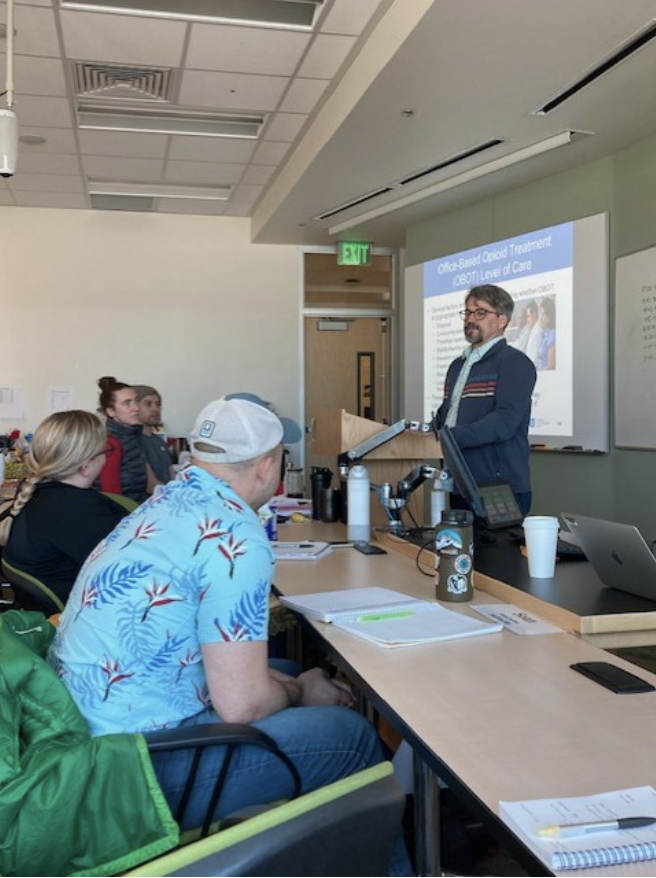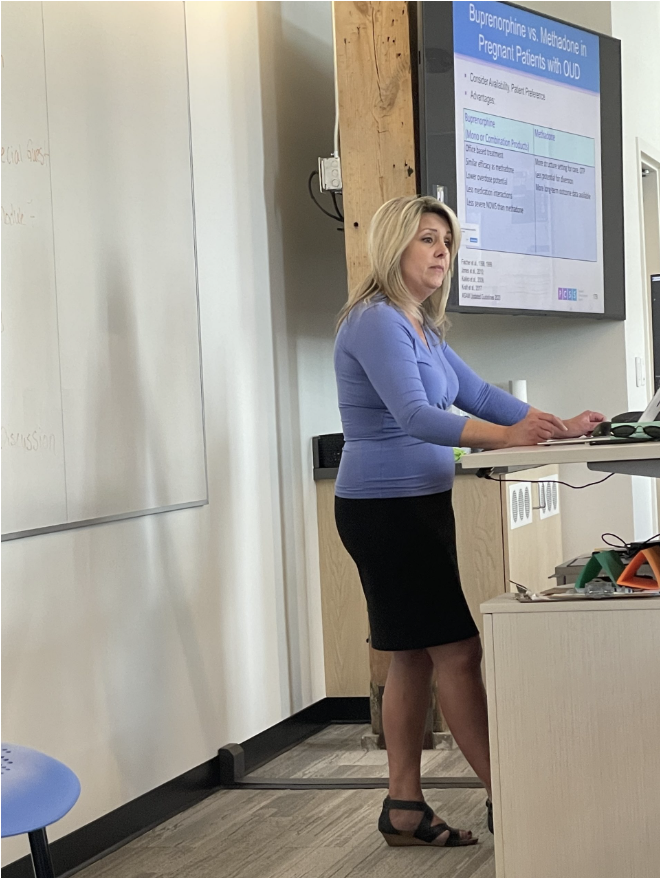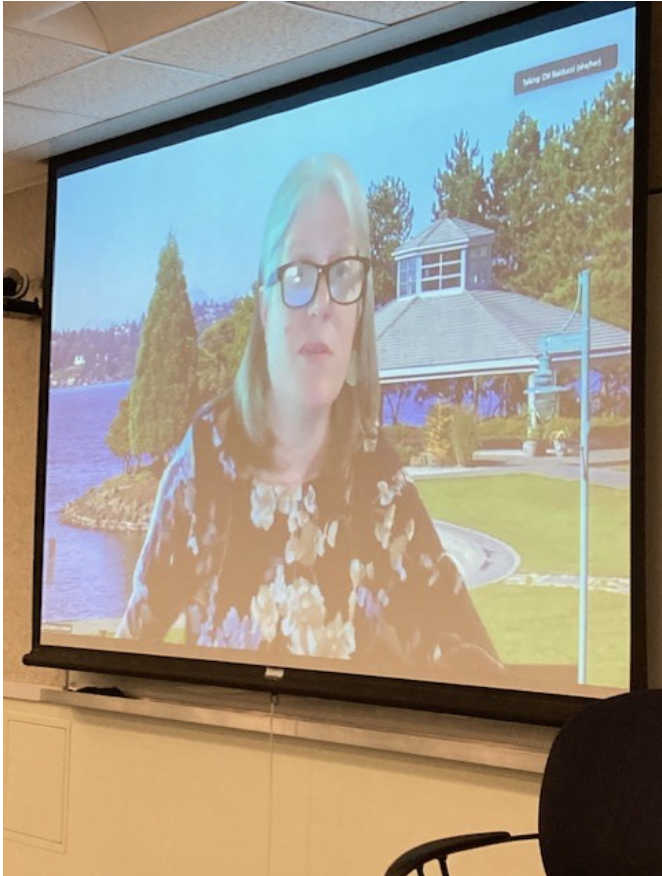MEDEX Northwest’s Anchorage, Kona, Spokane, Seattle, and Tacoma Campuses Host Full Day of Training on Medication for Opioid Use Disorder (MOUD)
On April 12, April 19, April 26, May 17, 2024, and May 21, 2024, community medical providers and students at the University of Washington MEDEX Northwest PA Program will participate in a full-day of education on the treatment of opioid use disorder (OUD). The trainings will occur at the University of Washington’s MEDEX Northwest campuses in Anchorage, Kona, Spokane, Seattle and Tacoma from 8:00am-5:00pm local time. These trainings will be led by Pamela Pentin, MD, JD, FAAFP; Krissa Orlowski, PA-C, DMSc; and Margot Karr, PA-C, University of Washington Department of Family Medicine faculty.

Pamela Pentin, MD, JD, FAAFP, Associate Professor, UW Department of Family Medicine

Margot Karr, BS, MSPAS, PA-C, MEDEX Northwest Assistant Teaching Professor, Clinical Coordinator

Krissa Orlowski, PA-C, DMSc, MEDEX Northwest Assistant Teaching Professor, Didactic Faculty
Drs. Pentin and Orlowski and Ms. Karr are teamed up on a mission to provide MEDEX PAs and providers across the state of Washington with the awareness and confidence to employ an important tool in the effective treatment of opioid use disorder: the drug known as Buprenorphine. Community leaders and local addiction medicine clinicians will be joining them in the enterprise.
“Providers know their patients best,” notes Dr. Pentin. “MDs, NPs, PAs, you name it, providers are uniquely situated to treat the patients they care for with OUD as a natural part of what we already do. We treat tobacco and alcohol addictions all day every day, so how is treating opioid addiction with Buprenorphine any different?”
The need for treating opioid addiction is stark. Some 100,000 Americans died of a drug overdose in 2023, most involving opioids like oxycodone, heroin, and fentanyl. Many others are regularly hospitalized for life-threatening opioid overdoses and for other medical complications of addiction. According to the Centers for Disease Control, this is an “epidemic of overdose” with deaths having quintupled over 20 years.
In the eyes of medical providers such as Pentin, Orlowski, Karr and others, the tragic fact in all of this is that clinicians have had a safe and effective way of treating opioid addiction available to them since 2002: Buprenorphine.
“Buprenorphine is a safe, synthetic opioid replacement drug available by prescription,” explains Orlowski. “It’s dispensed by community pharmacies and taken by patients under the tongue. It allows individuals to achieve sobriety where methadone clinics and hospital-based addiction services don’t exist.”
And yet the drug has remained under-prescribed and under-utilized for the past two decades, Orlowski explains, primarily due to stigma.
“Even where addiction services are available, the stigma of treatment often keeps people away and stuck in the spiral of their addiction. Imagine having to walk into a methadone clinic every day to face your demons and to get your dose of medicine, just to get through the day.”
Just as importantly, the stigma also reaches into the offices and practices of clinics and hospitals. Many clinicians are not willing to prescribe Buprenorphine for addiction for their patients. Indeed, less than 10% of medical providers nationwide prescribe Buprenorphine for OUD. “When I started doing this 20 years ago,” recalls Pentin, “I thought prescribing MOUD would be sad and depressing, and I steeled my nerves to do it. But it’s been truly joyful to watch patients turn their lives around and soar in sobriety. I want other providers to feel the joy OUD care can bring when they are successful in helping patients overcome this awful disease.”
In order to address stigma, past and upcoming MEDEX MOUD trainings take an unconventional approach. Key community leaders are invited to share with learners how and why MOUD makes the difference between life and death. Senators, representatives, tribal leaders, mayors, police chiefs, and leaders in public health and addiction medicine are invited to speak to learners to help break stigma and soften hearts. Without scripts, but speaking from the heart, leaders share community stories of success and emphasize the potential for positive change held in the hands of the learners in the room. These community leaders’ vulnerability and conviction drives the importance of MOUD home.

Anchorage (AK) Assembly Member Christopher Constant addressing MEDEX Anchorage studetns at the 2023 MEDEX MOUD training.

Spokane (WA) Mayor Nadine Woodward addressing MEDEX Spokane students at the 2023 MEDEX MOUD training.

King County (WA) Councilmember Claudia Balducci addressing MEDEX Seattle students at the 2023 MEDEX MOUD training.
Efforts to increase the numbers of Buprenorphine prescribers – which is encouraged by the U.S. Drug Enforcement Agency (DEA) as an emergency response to the opioid epidemic – have yet to yield big results. In 2021, the DEA lifted its requirement of special clinician training to prescribe Buprenorphine. And in 2023, the DEA eliminated all barriers to prescribing. But still the epidemic continues, and the death tolls remain disturbingly high.
In response, local government authorities have offered clinicians incentives to increase the availability of prescribers. For example, in Seattle and King County, the Washington State Public Health Department offered a $500 honorarium to any provider who would train to become a Buprenorphine prescriber. A few did, but still, a Buprenorphine-prescribing clinician is too often the exception to the rule.
But for Pentin, Orlowski, and Karr, change remains not only possible through education and training, but it’s also actually underway.
“When all the family medicine faculty physicians at the University of Washington became Buprenorphine prescribers,” Dr. Pentin reports. “Those physicians were in turn qualified to teach Buprenorphine prescribing to their trainees. And Buprenorphine has become the norm for treating opioid use disorder at UW. Now all family physician graduates of UW Medicine complete their training knowledgeable and practiced in prescribing Buprenorphine. It’s changed the game.”
In addition to the MEDEX Tacoma and Seattle students and faculty attending these full-day MOUD training sessions, community medical providers in the area are encouraged to attend as well.
“We encourage providers and clinicians of all stripes to attend, regardless of their discipline within medicine,” stresses Dr. Pentin. “It’s an opportunity to advance their clinical knowledge on this essential topic to best treat patient populations.”
Topics to be covered at the training include overcoming the stigma of addiction, evaluating patients for safety, the nuts and bolts of office-based prescribing and management, pharmacology, urine drug testing, counseling as part of treatment, and recognizing when the complexity of a patient demands additional resources.
The focus of the training on PA students, while including community practitioners in their midst, is intentional. “The treatment of opioid use disorder is squarely within the skill set of a PA,” says Dr. Orlowski confidently, herself a PA. “PAs are well-trained to manage anxiety, depression, addiction and other behavioral health disorders. MEDEX graduates will now become part of the solution, part of a growing army of clinicians poised to take on the opioid epidemic in the Northwest and beyond.”

Community providers and members of the media are encouraged to attend. Please contact Jim Wehmeyer (wehmej@uw.edu) for media inquiries and Xan Borseth (xanb@uw.edu) for additional information about these trainings.
MEDEX Northwest, established in 1969 at the University of Washington in Seattle, follows a long–standing mission to educate health care providers who will practice primary care in medically underserved urban and rural areas throughout the Pacific Northwest, Alaska, and Hawai’i.

